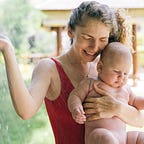Cloth-diaper: Savior or Saboteur?
Plastic straws and Bags, -what will happen if disposable nappies get banned next?
Once in a landfill, the plastics in disposable nappies can take 200 to 500 years to break down, while the methane released from the poo is 21 times more potent than carbon dioxide.
There is a problem; nobody can deny that. But what is the possible solution for us? “Cloth diapers!” is the most common answer in a recent survey in Sydney, Australia. Sure, parents who switch to cloth nappies can save up to $1000 a year, but are cloth diapers a realistic solution for every day? And how do they affect us and the environment?
News.com.au reported about Brisbane mum Rosie Adams, 29. She said she had been using cloth nappies for her baby daughter Abbie since she was one month old and would “definitely recommend” them.
She has about 40 cloth nappies in total and washes a batch each night after soaking them in Napisan. “She’ll go through seven to 10 a day,” Ms Adams said.
“She does go through more of them than disposables, but I have like three days’ worth and do a wash every day. I would definitely recommend cloth nappies. I have loved using them, and my partner has as well. We’ve kind of integrated it into our daily routine, so it’s not a hassle.”
But although on many measures reusable nappies are better for the environment, they come with their own costs, BBC News stated recently.
In particular, reusable nappies seem to be worse in terms of carbon emissions.
The Environment Agency, in 2008, estimated that over the two and a half years it reckoned a typical child would wear nappies, disposables would create 550kg (1,200lb) of carbon emissions. And reusables would create 570kg of carbon emissions.
That’s because of the energy it takes to wash and dry them.
So what should we do?
A big contra point against the cloth diapers is definitely the time involved in soaking, washing and drying them. But “It’s not a huge chunk of time”, Brisbane Mum Rosie said. “We have to do washing every day anyway.”
Some of us parents may have a spare hour a day, others already struggle with the daily buzz. Additionally, washing them on a full load, a more energy-efficient setting or by hand, and hanging them out to dry rather than tumble-drying can all reduce the environmental impact, BBC News advised to all the readers.
We are all different. But the fact is, that there is no perfect diaper solution. In the far future, there might be nappy and adult diaper recycling facilities across the globe. These could turn nappies into things like pet litter, insulation and compost, but have yet to be set up.
So what YOU can do today is your choice. The best solution would be to potty train your baby since day one. But is that really possible? A young couple stated “Yes!” last month in Australia. How they did the impossible you can read in my next article here on medium.com.pottysecerts.
Let me know what you think and what your experience regarding cloth diapers is. Am I missing something? And why is there no diaper-recycling centre yet?
In my following articles, I will tell you how to start with potty-training, what to do along the way and how other parents managed to do it. My Name is Julia and I am no mum myself. But spent the last 4 years helping parents all over Europe, Asia and Australia to raise their children and I have decided to publish my experience and share knowledge from all the supermoms and superdads out there. A big thank you to everyone that helped me and shared their secrets along the way.
Follow me on Instagram @ Pottysecrets, on Facebook @ Potty Secrets or read my online guide @ www.pottysecets.com
Thank you for reading my article, all the best to you and your loved ones. Stay safe.
